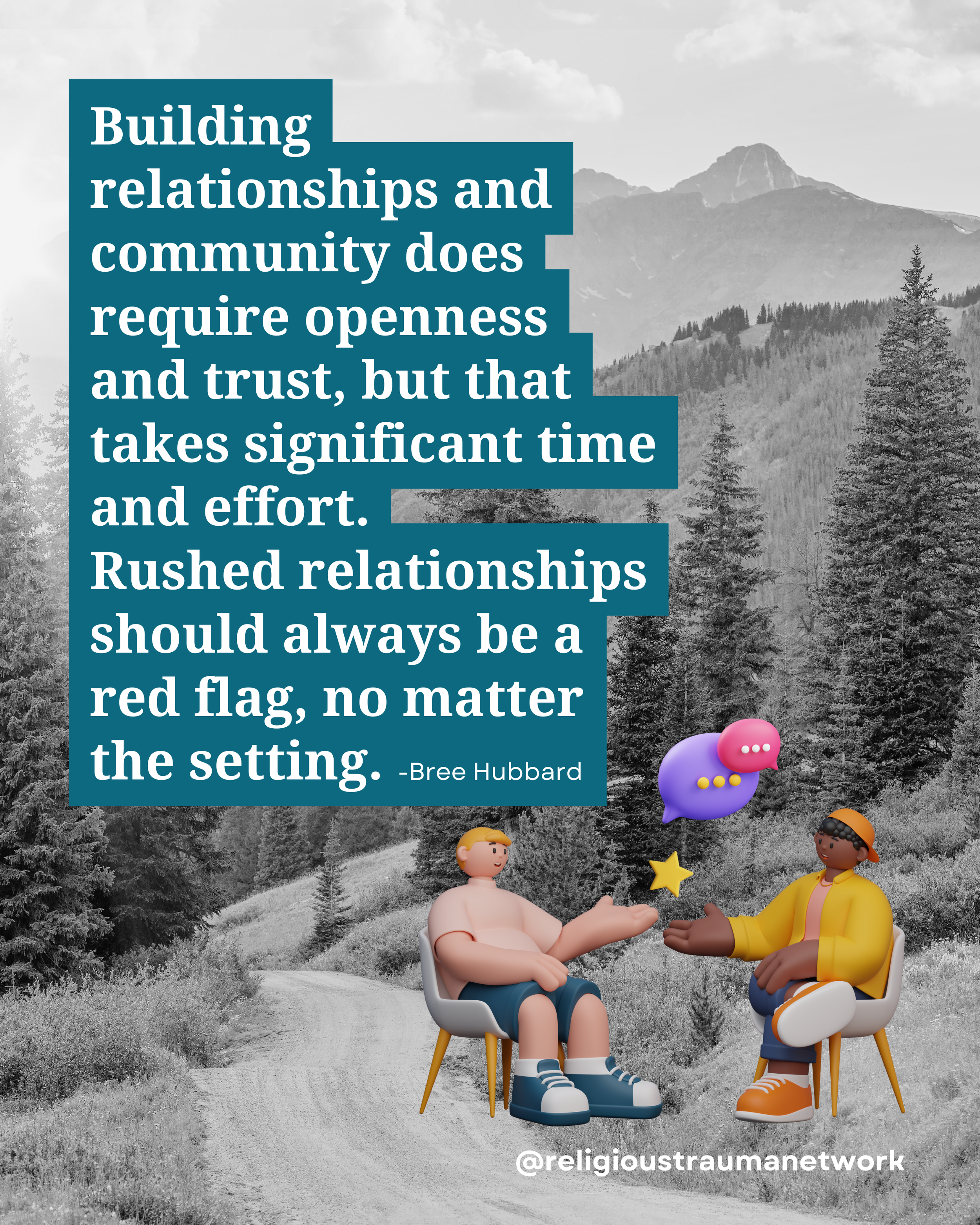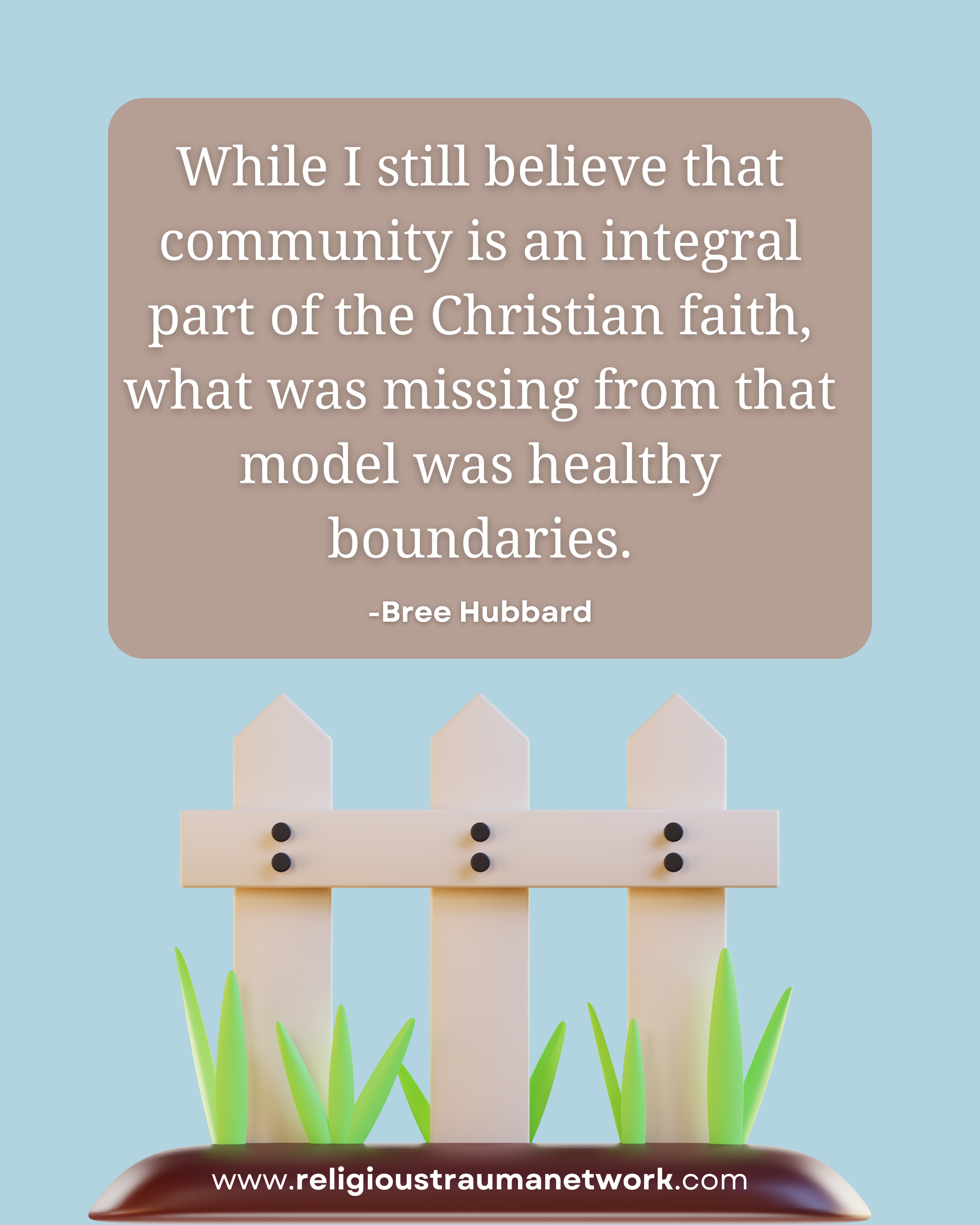Chocolate Cupcakes, Coffee, and Community: An Experience with Fellowship
by Bree Hubbard
“It’s a first birthday party. There should be cake.“
With that text from fellow mom and friend Margo* - and the hope of chocolate - giving me strength, I peeled my body off the couch, already exhausted from chasing a toddler all morning. Our friends were worth celebrating. At the party, I told Margo that I was thinking about going to church in the morning, but that I was nervous. My husband had to work, and I hadn’t gone to church without him in almost a decade—certainly not alone with our daughter. Later that night, Margo texted me to tell me that she was grabbing coffee in the morning, including one for me. It wasn’t until I was driving to church that I realized what she was doing. Like you would with a skittish animal, she was coaxing me out of hiding with food. And it was working.
What I should mention about Margo is that we both are survivors of religious abuse inflicted by members of the same ministry. We were not particularly close during our time there and had our own unique experiences, but we both know what it was like to be inside of and participate in a system sustained by manipulation and performative relationships.
Forced Vulnerability
Around us it feels like a new housing development is popping up weekly. Some friends recently bought a beautiful new build and alarmingly, within a few weeks of moving in, the cracks began to show—literally.
Leaking windows, a clear sign of fast and careless craftsmanship.
Religious communities, like quickly built houses, can appear beautiful and sturdy, but might instead be held together by forced vulnerability and false intimacy under the guise of spiritual submission. Why bother earning trust when fear or false closeness can get quicker results?
Harvard Business School professor Max H. Bazerman delves into the topic of unrealistic expectations in his book Complicit: How we Enable the Unethical and How to Stop (2022), stating that when unethical behavior is uncovered the place to start looking is what the expectations were. He found that when expectations set by leadership are unattainable by normal means, people are more inclined to behave in unethical ways.
If I need to put three small group members through leadership training in six months, I do not have time for relationships to develop normally, I need to start teaching them immediately. When congregations are held to quotas—whether it’s the amount of new members, baptisms, or small groups launched—people become numbers. When deadlines or quotas become our focus, the individuals get lost. Additionally, the lack of appropriate boundaries can be further exploited and can quickly escalate into other forms of abuse such as physical, mental, financial, and sexual.
Sharing too much too quickly in settings that have little to no boundaries can be dangerous, especially in already emotionally heightened areas such as religious ones. Testimony sharing is a good example of this, as what is generally considered to be a positive tool, can become a trauma-dumping session very quickly. Ill-timed testimonies and other forms of rushed vulnerability can create a false intimacy that quickly crumbles when faced with normal relationship stressors leaving all parties raw and hurting.
Building relationships and community does require openness and trust, but that takes significant time and effort. Rushed relationships should always be a red flag, no matter the setting.
Living Life Together
The ministry we were a part of had the saying, “Living Life Together.”
What was a small group? What was discipleship? It’s just living life together. What was not said out loud was the expectation of living almost every second of life together. If we had a free day, we were expected to spend it with a small group member. Busy week at work? Still expected to spend time with people in the ministry. Need a few days to rest? You must be falling away from the Lord.
While I still believe that community is an integral part of the Christian faith, what was missing from that model was healthy boundaries—ones that honored individual capacity, seasons of life, and the humanity of both leaders and members.
Like I mentioned earlier, Margo and I both left ministry in 2017 - me in the spring and her in the fall. Shortly after, she and her husband moved to our current city, while my husband and I stayed behind. We kept in touch and they told us about their church and how the pastors there genuinely valued community within the congregation. We admired their commitment and said we’d love to visit if we ever made the move.
When my husband and I got new jobs and moved in 2021, we reconnected with Margo and her husband, and visited their church and small group. We truly enjoyed it. But as we continued to unpack our boxes, grief flooded our new home and the weight of all that we had gone through hit us. We are both pretty steady people, but the thought of entering into a religious setting would send one or both of us into a full blown panic attack.
It didn’t take long for Margo to realize what was happening and she didn’t push. They continued to invite us - not just to church and small group, but also to dinner, movies, or just time with them. And every invitation ended with, “But if you can’t or don’t want to, please don’t. They carved out time for us - for our hurt and our healing.
Henri J.M. Nouwen once wrote “Hospitality means primarily the creation of free space… [it] is not to change people, but to offer them space where change can take place” (Reaching Out: The Three Movements of the Spiritual Life, 1975). This is what Margo and her husband did for us. Over time, we started attending small group in their home and eventually, we found our way back to church. It’s taken years for us to attend services regularly. We have learned when to challenge ourselves and when to give ourselves grace and recognize that space is not always negative.
Over the years, our community has grown, but this time in a different way. There has been healthy, organic growth of trust and relationships. Margo, our husbands, and I have all shared pieces with our group about what happened to us, but when the moments were appropriate and when we felt comfortable enough to. And other members have done the same with their lives. Children have naturally slowed our pace, but even so, we have still found time for vulnerability with each other.
We have learned about each other’s past hurts, addictions, and traumas but also of triumphs and treasured memories. Our group has supported each other through job promotions, pregnancy losses, and even a whole brain tumor (he is okay now and walking straight again).
Unexpectedly, three other couples in our group are also survivors of religious abuse—two of them from the same ministry we were a part of.
So are we “living life together”? I guess. But I would prefer to say that we have committed to the mundane and complicated of each other’s lives - in healthy ways. Through time and effort, we open up space for each other and carefully laid foundations of friendship. I have a list on my phone where I keep track of their coffee orders, but also the date of my friend’s mom’s passing with a reminder to check in with her. We respect each other’s boundaries. If someone cannot make a small group due to a rough night with a teething baby or busy day at work, the response is usually “Would some banana bread dropped off at your door make it better?”
I recognize that our current community is a tremendous blessing and not something that everyone has access to.
And while we’ve found this community within a faith setting, I want to say clearly: that doesn’t have to be the case for everyone.
I want to emphasize that all of those relationships had two things in common - time and honor. There was time and effort put in by both parties and the understanding that a healthy friendship is not built overnight. And honor for each other as individuals with our own intrinsic value. I also want to note that despite this beautiful community we get to be a part of, there are still days I want to stay home and that’s okay. Time for myself, my husband, and our family are important. But some days, friendship and community is worth the extra effort - especially if that extra effort is rewarded with a chocolate cupcake with a plastic dinosaur on top or a cold brew with caramel drizzle.
*Margo’s name has been changed.
About the Guest Author:
Bree Hubbard writes under a pen name. She earned her Masters in 2021 specializing in institutional/religious abuse and neurobiology of trauma. Bree is employed full-time in victim services, currently responding to child sexual exploitation on an international level, and has been in the non-profit industry for over a decade. She and her husband are both survivors of religious abuse and are waiting with anticipation for the day they are able to openly share their story.
Disclaimer:
The views, thoughts, and opinions expressed in guest blog posts are those of the individual authors and do not necessarily reflect the positions of the Religious Trauma Network. We recognize that each person’s healing journey is unique, personal, and courageous. The stories shared here belong solely to the contributors, and their experiences, perspectives, and advice may not apply to everyone. We encourage readers to honor their own paths and seek professional support as needed.


